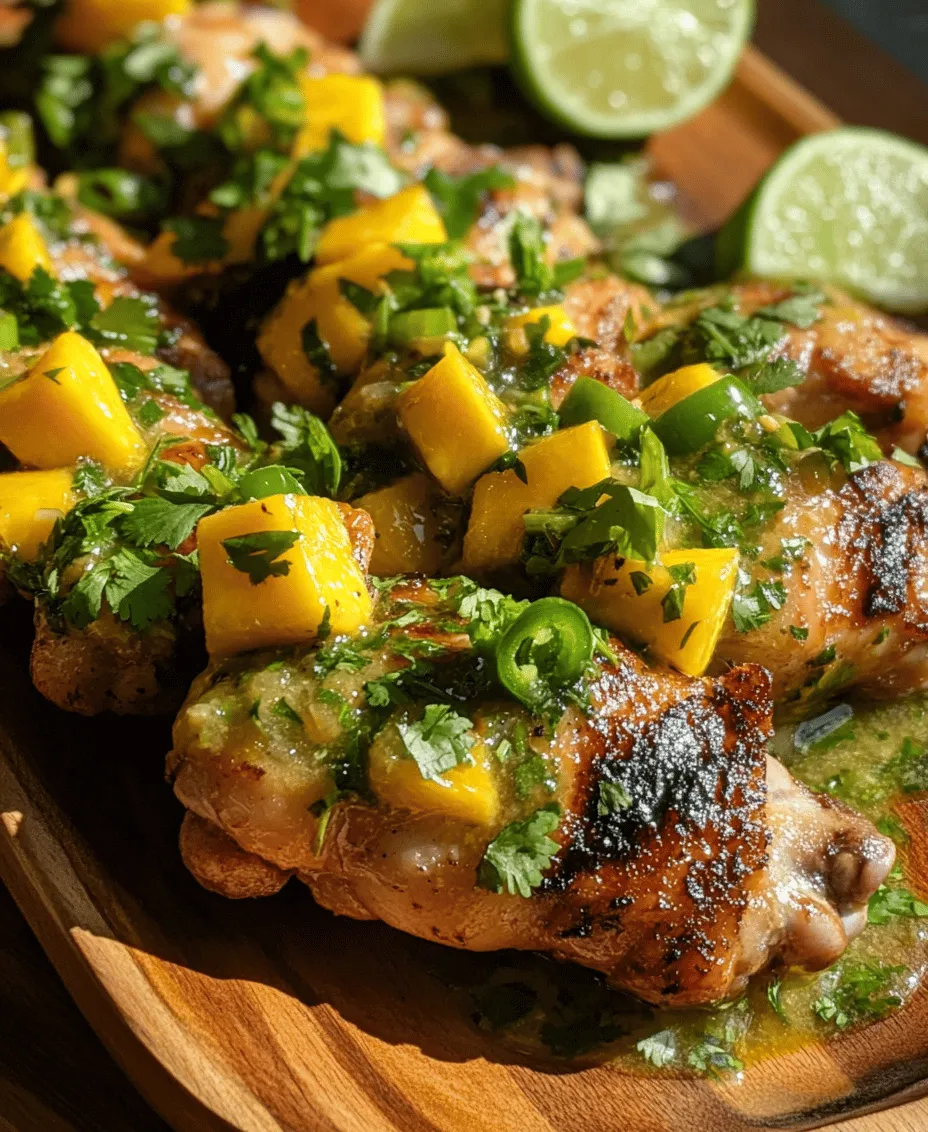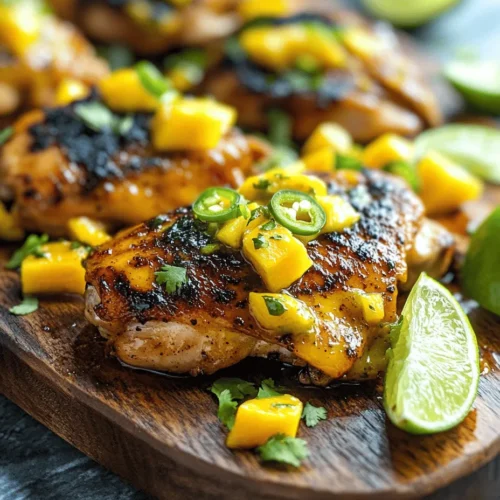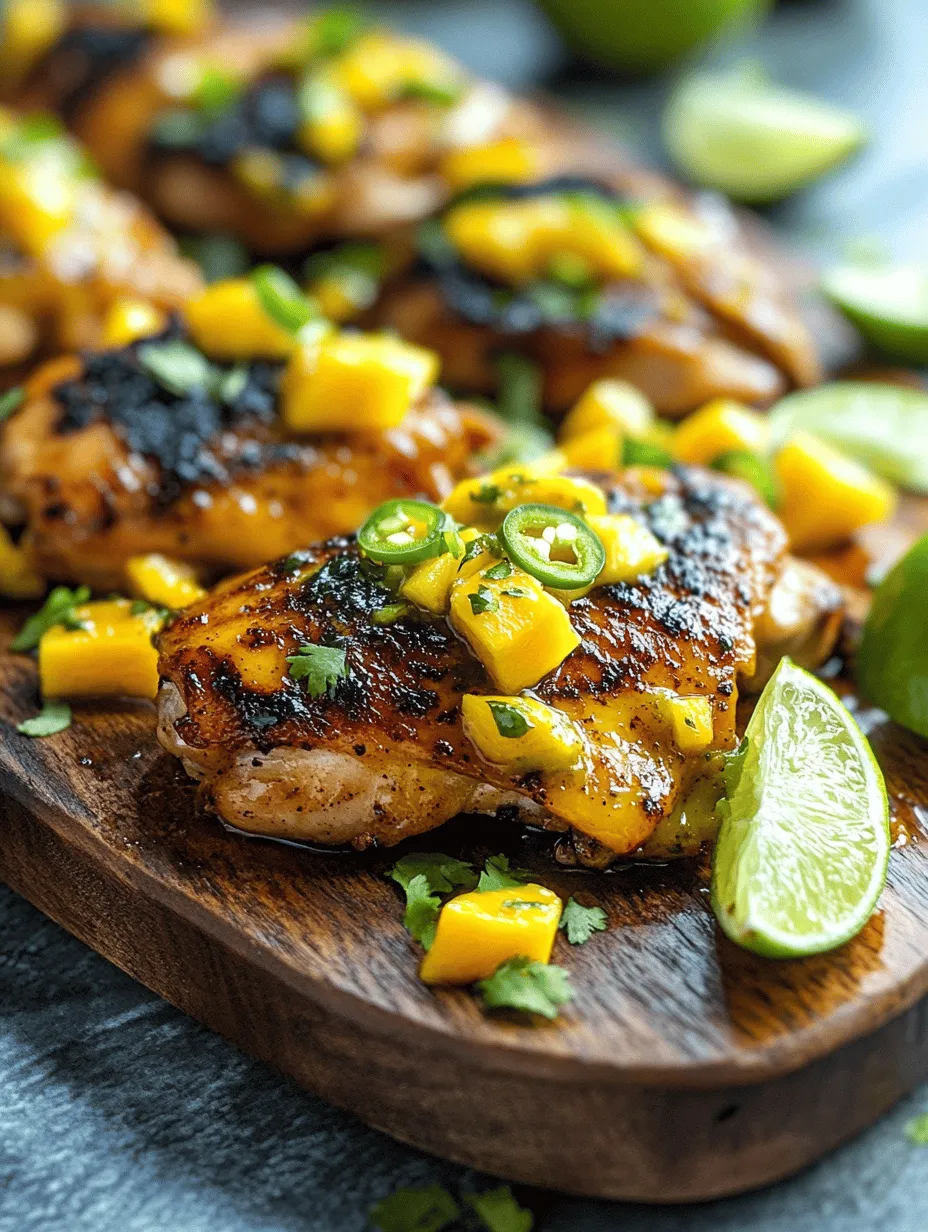Introduction
Welcome to the vibrant world of “Chicken in Coconut Mango Verde Sauce,” a dish that embodies the essence of tropical flavors, perfect for any dinner table. This recipe beautifully marries the rich, creamy notes of coconut milk with the sweet, juicy allure of ripe mango, all while complementing succulent marinated chicken thighs. The dish is not only a feast for the eyes, with its bright colors and enticing aromas, but it’s also a wholesome choice for family dinners, special celebrations, or a delightful weeknight meal that requires minimal effort but delivers maximum satisfaction.
Using fresh, natural ingredients, this recipe showcases the benefits of a healthy diet without sacrificing taste. The incorporation of fragrant herbs and zesty spices not only elevates the flavor profile but also adds a nutritional punch. Chicken thighs, known for their tenderness and juiciness, take center stage in this dish, making it an excellent choice for those who appreciate flavorful, moist meat.
Whether you’re looking to impress guests or simply want to treat your family to something special, Chicken in Coconut Mango Verde Sauce will undoubtedly become a favorite. Let’s dive into the exciting ingredients that make this dish so unique and delicious!
Understanding the Ingredients
To craft the perfect Chicken in Coconut Mango Verde Sauce, understanding each ingredient’s role in the dish is crucial. Here’s a closer look at what you’ll be working with:
Boneless, Skinless Chicken Thighs
When it comes to selecting chicken for this recipe, boneless, skinless thighs are the star of the show. Unlike chicken breasts, which can often dry out during cooking, thighs are inherently juicier and more flavorful. This part of the chicken contains more fat, which not only helps to keep the meat moist but also allows it to absorb the marinade deeply, resulting in a richer taste. Additionally, thighs are more forgiving in terms of cooking time, making them an excellent choice for both novice and experienced cooks.
Coconut Milk
Coconut milk is a key ingredient that contributes to the dish’s creamy texture and tropical flavor. It acts as a rich, dairy-free alternative to traditional creams, providing a luscious base for the sauce. Coconut milk is not only delicious but also offers various health benefits, such as being lower in calories than heavy cream and containing medium-chain triglycerides (MCTs), which can help with weight management and energy levels. When selecting coconut milk, look for brands that use minimal additives to ensure a clean, authentic flavor.
Ripe Mango
The star of the sauce is undoubtedly the ripe mango, which adds a delightful sweetness and vibrant color. Mangos are rich in vitamins A and C, making them a nutritious addition to your meal. When choosing a mango, look for one that yields slightly to pressure and has a fragrant aroma. A perfectly ripe mango will enhance the sauce’s sweetness, creating a harmonious balance with the savory elements of the dish.
Fresh Cilantro and Green Onions
Fresh herbs like cilantro and green onions are essential for adding brightness and freshness to the dish. Cilantro, with its distinctly aromatic leaves, enhances the overall flavor profile with a hint of earthiness. Green onions (or scallions) offer a mild onion flavor and a crunchy texture, providing a pleasant contrast to the creamy sauce. Together, they elevate the dish, making every bite refreshing and aromatic.
Jalapeño
For those who enjoy a bit of heat, jalapeño peppers can be included to spice things up. The level of spiciness can be easily adjusted based on personal preference—simply remove the seeds and membranes for a milder flavor, or keep them in for an extra kick. Jalapeños not only add heat but also contribute to the overall flavor complexity of the sauce.
Garlic and Lime Juice
Garlic is a culinary powerhouse that adds depth and aroma to the dish. Its pungent flavor mellows during cooking, enriching the sauce without overpowering it. Lime juice brings a zesty brightness that balances the sweetness of the mango and the richness of the coconut milk. The acidity from the lime juice also acts as a natural tenderizer, enhancing the chicken’s texture and flavor.
Ground Cumin and Coriander
These two spices are essential in bringing warmth and depth to the Coconut Mango Verde Sauce. Ground cumin offers a smoky, earthy flavor, while coriander adds a hint of citrus and sweetness. Together, they create a well-rounded spice blend that perfectly complements the tropical ingredients. The combination of these spices is not only flavorful but also provides various health benefits, such as aiding digestion and offering antioxidant properties.
Olive Oil
As a cooking fat, olive oil is a heart-healthy choice that adds richness to the marinade. It helps to evenly coat the chicken and allows for better flavor absorption during the marination process. Rich in monounsaturated fats, olive oil is known for its anti-inflammatory properties and can support overall heart health.
Marinating the Chicken
Marinating the chicken is a crucial step that significantly impacts the flavor and tenderness of the meat. A good marinade infuses the chicken with flavor and helps to break down the proteins, resulting in juicy, tender meat.
Preparing the Marinade
To create a delectable marinade for the chicken, you’ll need to combine the following ingredients: lime juice, olive oil, minced garlic, ground cumin, ground coriander, chopped cilantro, jalapeño, and salt. The ratio of oil to acid (lime juice) is essential for achieving the right balance—generally, a 2:1 ratio of oil to acid works well. This balance ensures that the chicken is not only flavorful but also remains moist during cooking.
1. Combine Ingredients: In a mixing bowl, whisk together the olive oil, lime juice, minced garlic, ground cumin, and ground coriander until well blended.
2. Season: Add chopped cilantro, diced jalapeño, and salt to the mixture. Stir to combine and taste—adjust the salt and spice levels according to your preference.
Timing for Optimal Flavor
For optimal flavor infusion, marinate the chicken for at least 30 minutes, although longer is always better. A marination period of 2-4 hours allows the flavors to penetrate the meat thoroughly. For maximum tenderness and flavor, consider marinating overnight in the refrigerator. Just be sure to keep the chicken covered to prevent any cross-contamination with other foods.
Creating the Coconut Mango Verde Sauce
Once the chicken is marinated, you can move on to creating the Coconut Mango Verde Sauce. This step is where the dish truly comes to life, as the combination of ingredients melds together to create a deliciously creamy and flavorful sauce.
1. Sauté the Aromatics: In a large skillet, heat a splash of olive oil over medium heat. Add minced garlic and diced jalapeño, sautéing until fragrant—about 1-2 minutes.
2. Add Coconut Milk: Pour in the coconut milk and stir to combine with the sautéed ingredients. Allow the mixture to come to a gentle simmer.
3. Incorporate Mango: Add diced ripe mango to the skillet, stirring gently to combine. Allow the sauce to simmer for a few minutes, letting the mango soften and infuse its sweetness.
4. Season the Sauce: Taste the sauce and adjust seasoning with salt, lime juice, and additional spices as desired. If you prefer a thicker sauce, let it simmer for a few minutes longer, allowing it to reduce slightly.
5. Blend for Smoothness: For a velvety texture, consider blending the sauce with an immersion blender or transferring it to a standard blender. Blend until smooth, then return to the skillet and heat through.
This Coconut Mango Verde Sauce is not only versatile but also pairs beautifully with the marinated chicken, creating a dish that is as delicious as it is visually appealing.
Now that we’ve set the stage with the ingredients and initial steps, let’s dive deeper into the cooking process and explore how to bring this tropical delight to your table.

Blending the Ingredients
To create a smooth and flavorful sauce for your Chicken in Coconut Mango Verde Sauce, proper blending is key. Start by adding the mango, cilantro, green onions, jalapeño, lime juice, and coconut milk into a high-speed blender. When blending, ensure that you blend in short bursts rather than continuously running the blender. This technique allows you to stop and scrape down the sides to ensure all ingredients are well incorporated.
As you blend, taste the sauce. If you find it too sweet or not tangy enough, you can adjust the flavors. To enhance acidity, add more lime juice; for a touch of sweetness, consider a drizzle of honey or agave. If you prefer a spicier kick, add additional jalapeño or a pinch of cayenne pepper. The ability to adjust flavors to suit your palate is one of the joys of cooking, so don’t hesitate to experiment.
Adjusting Seasoning
Once your sauce is blended, it’s crucial to taste and adjust the seasoning. The balance of flavors is essential; you want to achieve a symphony of sweetness from the mango, creaminess from the coconut milk, and a zesty kick from the lime and jalapeño. Start by adding salt incrementally, tasting as you go. Remember, it’s easier to add more salt than to remove it. If the sauce feels flat, a little more lime juice or even a pinch of sugar can elevate the flavors.
Incorporating freshly ground black pepper can also add depth. Lastly, if your sauce is too thick, you can thin it out with a splash of water or more coconut milk until you reach your desired consistency.
Cooking the Chicken
With your sauce ready, it’s time to turn your attention to the marinated chicken. A well-cooked chicken is not just about flavor; it needs to be cooked to perfection to ensure it remains juicy and tender.
Heat Management
Begin by preheating a large skillet or frying pan over medium-high heat. This temperature is crucial as it allows the chicken to develop a golden brown exterior while locking in moisture. Once your pan is hot, add a drizzle of oil to prevent sticking. Place the marinated chicken pieces in the pan, ensuring they are not overcrowded. Cooking in batches may be necessary if you are preparing a larger quantity.
Cook the chicken for about 5-7 minutes on each side, or until the internal temperature reaches 165°F (75°C) and the exterior is beautifully browned. Avoid flipping the chicken too soon; allowing it to sear properly will enhance the flavor and texture.
Resting the Chicken
After cooking, don’t skip the resting stage. Transfer the chicken to a plate and cover it loosely with aluminum foil. Resting for about 5 minutes allows the juices to redistribute throughout the meat, resulting in tender, juicy chicken. Cutting into it right after cooking can cause the juices to run out, leading to dry pieces.
Combining and Simmering the Sauce
Once your chicken is rested, it’s time to bring everything together. Return the cooked chicken to the skillet and pour the blended mango verde sauce over it. Ensure each piece of chicken is well coated in the vibrant sauce.
Simmering for Flavor Integration
Reduce the heat to low and let the chicken simmer in the sauce for about 10-15 minutes. This simmering process is essential as it allows the flavors to meld and intensify. The coconut milk will thicken slightly, creating a luscious sauce that clings to the chicken. As it simmers, stir occasionally to prevent sticking and ensure even coverage. The result will be a beautifully harmonious dish where the chicken absorbs the tropical flavors of the sauce.
Serving Suggestions
To present your Chicken in Coconut Mango Verde Sauce, consider the visual appeal of your dish. The bright colors of the sauce against the golden-brown chicken create an inviting plate that is sure to impress.
Plating the Dish
For an elegant presentation, serve the chicken on a large platter or individual plates. Spoon a generous amount of sauce over the chicken, allowing it to pool around the edges. For a finishing touch, garnish with freshly chopped cilantro and lime wedges. The green cilantro adds a pop of color, while the lime offers an additional zesty element that diners can squeeze over their servings for an extra burst of flavor.
Pairing with Side Dishes
To complete your meal, consider serving the chicken with coconut rice or jasmine rice, which complements the tropical flavors beautifully. A fresh side salad with mixed greens, avocado, and a light vinaigrette can add a refreshing crunch to the dish. For a heartier option, roasted vegetables or plantains provide a satisfying contrast to the creamy sauce.
Nutritional Information
Chicken in Coconut Mango Verde Sauce is not only a delightful dish but also a nutritious one. Here’s a breakdown of the nutritional content per serving:
– Calories: Approximately 350
– Protein: 30g
– Carbohydrates: 25g
– Fat: 15g
– Fiber: 4g
Caloric Breakdown
The caloric content primarily comes from the chicken and coconut milk, both of which provide essential nutrients. The chicken is a lean source of protein, while coconut milk offers healthy fats that can help keep you satiated.
Health Benefits
Incorporating this dish into your diet can provide numerous health benefits. Chicken is rich in protein, vital for muscle growth and repair, while mangoes are an excellent source of vitamins A and C, both of which support immune health. The addition of cilantro, lime, and jalapeños adds antioxidants and enhances digestion, making this dish not only delicious but also a nutritious option for any meal.
Conclusion
Chicken in Coconut Mango Verde Sauce is a vibrant and flavorful dish that beautifully showcases the freshness of its ingredients. The combination of juicy marinated chicken with a creamy, tangy sauce creates an irresistible meal that is perfect for any occasion. Whether you’re hosting a dinner party or looking to impress your family with something special, this dish delivers on taste and presentation.
The versatility of this recipe allows you to adapt it to various dietary preferences, making it suitable for both casual weeknight dinners and more elaborate gatherings. Embrace the tropical flavors and enjoy the delightful experience of cooking and sharing this colorful meal with loved ones.


